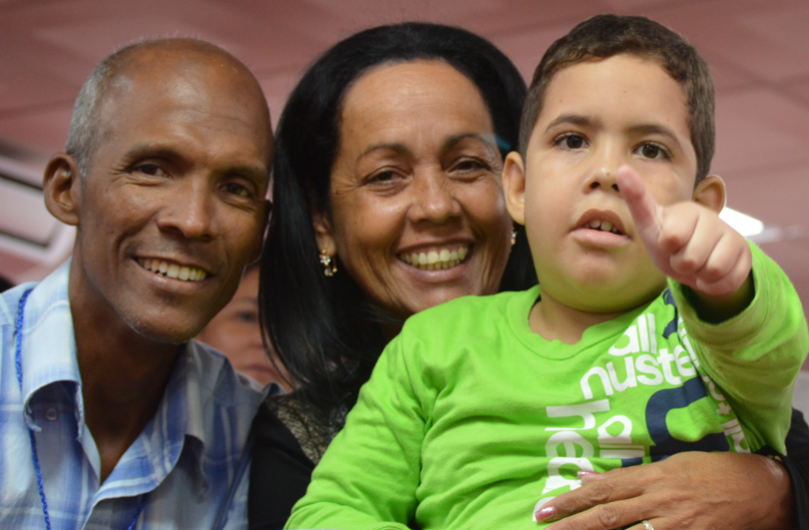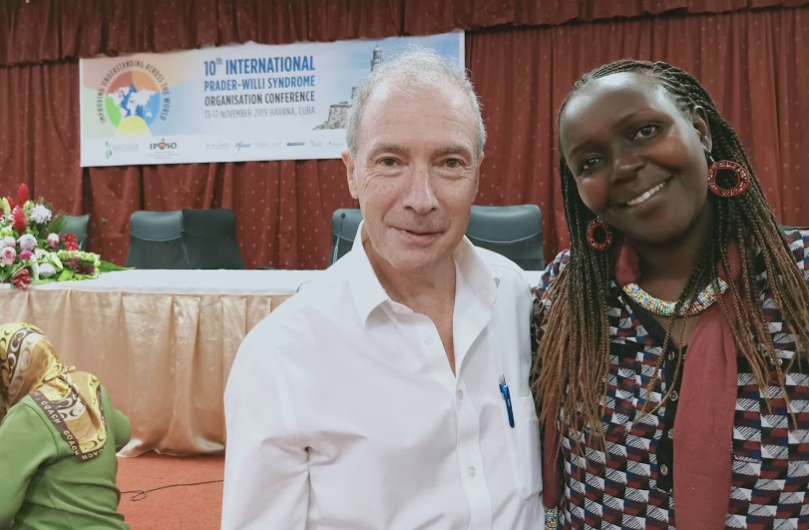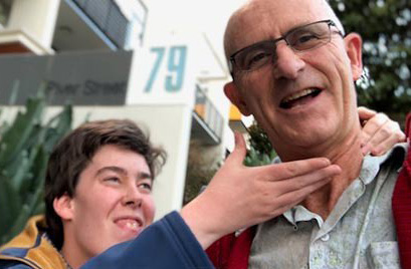When a person with Prader-Willi syndrome is in trouble with the law
People with Prader-Willi syndrome (PWS) may get into trouble with the police and may have to appear in Court because of behaviour relating to food (for example stealing food, other consumables or money; eating in restaurants and not being able to pay), having a temper outburst and hitting or threatening another, or other antisocial behaviour.
Such events cause great concern to people with PWS, their families and any other people involved. This page sets out some of the issues that should be considered on such occasions. It cannot give definitive recommendations, as exactly what happens will depend on the policies and laws of the country where the offence is alleged to have been committed. Also, at an individual level, there will be differences if the person concerned is a child or an adult with diminished capacity and the outcomes may be influenced by the attitude of the police and courts, access to good legal advice, support from the family and others, and the presence of an established and fair criminal justice system. However, ensuring that all concerned have at least some understanding of PWS can have a positive effect.
The criminal justice system
Usually it is the police who are called in the event of behaviour that is thought by others to be against the law (e.g. shoplifting, hitting another person). The police may exercise some discretion based upon their assessment of the situation at the scene, varying from giving an informal warning to arresting and charging the person who is alleged to have engaged in unlawful behaviour (for example, theft or assault). If there are concerns about the person’s health at the time the police arrive, urgent medical advice may be requested. This, for example, would be important if the person with PWS appears to be displaying unusual symptoms and/or was known to have had a previously diagnosed mental illness, such as bipolar disorder or psychosis, or there is any indication that they are physically unwell.
Once arrested and out of the hands of the police, different countries will have their unique processes that are followed, but this may be a point in which the authorities (prosecution) may show some discretion. They may decide not to proceed with charges and to just give a formal warning. It is also possible that they may decide to prosecute and go to Court. Different criteria may apply in different countries, but this decision could be influenced by their knowledge of the person and how their alleged behaviour may have related to them having PWS; by whether or not, in the event of the person pleading not guilty, there is a reasonable chance of conviction; and more generally, whether it is considered in the public interest to prosecute.
Key points:
- PWS is a rare condition and it is unlikely that the police and lawyers involved will have heard of it. It is during this period of time, when the authorities might be deliberating about what to do, that information should be provided about PWS so that they can put the alleged crime within the relevant context. If you have a National PWS Association it may be able to help, if not, IPWSO can provide information. Parents, you will also have become experts about your child with PWS but sometimes information from a neutral source or even another parent advocate can be more influential. Information may initially be provided verbally but ideally it should also be given in writing.
- If there are concerns that the incident that led to police involvement was out of character or unusual for that person and that they may have developed a physical illness (e.g. complaining of pain or vomiting) or have become mentally unwell (e.g. disturbed mood, unusual behaviours or ideas), those concerned should be advised to seek medical help immediately.
At the time of initial police involvement and subsequent interview
It has been recognized that people with impairments in cognitive and social abilities and particularly people who are considered to have an intellectual (learning) disability, may be vulnerable when interviewed by the police and may not understand what is happening in the legal process. In some countries laws require the police and courts to make special provision for those who are seen to be at risk at this time, and the courts may ask for additional assessments before deciding exactly what to do.
Early in the process, your ability to convey your understanding of the person with PWS may enable you to bring calm to the situation and to provide sufficient information that all concerned decide not to proceed further. However, if the person with PWS is arrested and has to attend a police interview, it is important to appreciate that he/she may fail to fully understand what is happening and the potential seriousness of the situation. In many countries there will be the requirement to formally warn the person arrested that the evidence collected during interview may be used in any subsequent court appearance – referred to as ‘the caution’. People with intellectual disabilities, including people with PWS, may not understand this warning and may implicate themselves in the way that they answer questions. People have been known to confess to things they did not do, perhaps because of the stress at the time or because they didn’t understand what was happening or what was being asked of them. For people with PWS food or the lack of it and the associated anxiety may influence how they respond or behave. Food might also be an inducement to say and do things that are unhelpful or may not be correct. The drive to eat is so strong in people with PWS that food offered to a person with PWS while in custody at a police station or in prison, may become an incentive to “reoffend”. If the alleged offence for which the person with PWS has been charged is serious, the police, and later the courts, may decide that the person should be held in custody (usually in jail) until the case is presented in court. Jail is not a healthy environmental situation for a person with PWS, and one must advocate for food security, opportunities for exercise, and access to preferred activities for stress management or appropriate sensory stimulation. Also, there is the potential that the person with PWS will be taken advantage of by other prisoners.
Key points:
- At the time of arrest inform the police that the person being arrested has a genetic condition called PWS (it may not be immediately obvious to the police that the person has a medical condition particularly if the person has been on growth hormone since childhood) and that this will affect his/her understanding of what is happening, that food has a particular significance and that he/she will be particularly vulnerable to exploitation and mental ill-health in certain circumstances, such as if held on remand in prison.
- Ensure that the police officers interviewing and any lawyer representing the person with PWS is aware of the features of PWS and how the environment where the interview takes place, his/her level of understanding of the questions, and the presence or absence of meals, may all make a difference. Also inform the interviewers that the rigidity displayed by some people with PWS and their inability to respond to the demands placed upon them in these strange and changing circumstances, are characteristic features of the syndrome and should not be taken as necessarily an indication of evasiveness, lying or uncooperativeness. The interviewers also need to know to speak to the person with PWS using simple language and allow extra time for them to comprehend what is said to them and to respond appropriately.
- In most countries it is a requirement that the person is legally represented during the interview unless he/she waives that right. For someone with PWS that representation, ideally by a lawyer who has some understanding of disability, may be particularly important in ensuring that his/her rights in the interview are protected. If the law of your country allows, also ensure that any additional help is present (for example, an independent person, with a good knowledge of PWS, supporting the person with PWS during the interview – sometimes referred to as ‘an appropriate adult’). This person may, for example, check that he/she understands what it is that is being asked.
If a decision is made to prosecute and to go to court
For the criminal justice process to be fair there is an expectation that the person being prosecuted is legally represented, is able to participate in the preparation of their defense, understands the charges and the difference between pleading guilty or not guilty, knows the roles of the different people in court (judge, prosecutor, defense attorney), understands and the different stages of any hearing and how to behave during the court process. In the lead up to a court appearance, questions may be raised as to whether he/she is fit to stand trial (i.e. understands the significance of the trial on his/her life) and is fit to plead (i.e. understands what pleading means, understands the nature of the charge and the court process). Depending on the laws of the respective country, these may be issues that are examined formally, and expert evidence from a psychologist or psychiatrist might be requested by the court or may be arranged by the person’s lawyer to determine capacity. If there are concerns about the person’s competency, the courts may decide not to continue and a different course of action may be suggested. Whether or not and how these issues are addressed will be very dependent on the laws of the country, but these are sometimes critical periods in the criminal justice process where charges may be dropped or a different course of action is followed.
Key points:
- Seek guidance from the defence lawyer as to whether or not the person with PWS is able to understand the trial and will receive a fair trial. It may be helpful to obtain an independent expert opinion to determine whether the person with PWS is likely to understand the trial process. Depending on the laws of the country the court may decide not to proceed with a trial and a different course of action is followed. In some countries, if a person is deemed incompetent to stand trial, they may be transferred to a secure hospital instead of being sentenced or may temporarily go to a special prison where they are taught about the court process so they can become competent in order to stand trial.
- Proper legal representation before and during court proceedings is essential, ideally from a lawyer who is willing to learn about PWS and has experience in the field of disabilities in general. Through good legal representation and support to understand the proceedings the person with PWS has the best chance of receiving a fair trial.
- The person with PWS should be supported throughout the process as much as the court allows and should be helped to understand the proceedings, so as to reduce uncertainty and confusion.
A guilty plea or a guilty verdict: sentencing
If the person with PWS goes to trial he/she may decide on legal advice to plead guilty, and the court will proceed to sentencing. If he/she decides to plead not guilty, then the court hearing will commence. There will be differences between countries, but in general, it is for the court to determine beyond reasonable doubt two factors: first that the alleged offence (hitting someone, stealing food) happened (referred to in some jurisdictions as actus reus), and secondly, that it wasn’t simply an accident but the act was done with intent, or was a result of recklessness and should have been foreseen (referred to in some jurisdictions as mens rea). Depending on circumstances magistrates or a jury will listen to the evidence and arrive at a judgment.
If guilty, in considering sentencing the options will vary between countries and may vary depending on the type of court. The court may seek expert or other evidence that will help the Magistrates or Judge to arrive at an informed and fair sentence – referred to as evidence in mitigation. Where someone is known to have a medical condition (PWS) this may influence the court. The issues the court will consider are the protection of the public, if the person is considered likely to behave in a dangerous way again, the need for punishment so that victims feel justice is done, and any special factors like the need for psychiatric treatment as opposed to punishment. Options may include a fine; a probation order sometimes with conditions as to where to live in the community and agreeing to supervision; imprisonment; or diversion from the criminal justice system to, for example, a specialist hospital. A positive outcome may be that the court decides someone can return to live, for example, in a supervised setting in the community where any risk of re-offending is reduced through the supervision he/she will receive.
Key points:
- Depending on the legal system the prosecution lawyers will be required to prove that the person committed the act he/she are alleged to have committed and that they intended to do it, or they were reckless in committing the act and it could have been prevented
- If pleading guilty or found guilty the court may seek evidence in mitigation such that a more lenient or different sentence can be justified.
- Courts must consider various factors when determining sentence including possible future risk to the public and the seriousness of the offence, as well as support options available in the community.
- Courts may have the option to divert someone from the criminal justice system to a supervised setting in the community or to the care of health staff so that they can receive treatment.
Final points
If someone with PWS is repeatedly engaging in very difficult behaviour and is refusing to accept support (for example to live in a food secure environment) the involvement of the courts may enable interventions that are of benefit to the person concerned. For example, through a probation order the courts may stipulate that the person must live at a particular place where access to food can be controlled and appropriate and informed interventions can more effectively bring the person’s behaviour under control.
If the criminal justice system is involved what then happens will be in the hands of the police and/or the Courts. You can best help in two ways: first, be there for the person with PWS and support them at each step in an informed way, and secondly, keep lawyers and others in the criminal justice informed in the belief that they will then use this knowledge to get the best outcome.
This article was written by IPWSO’s Famcare Board.
International Community
IPWSO was established so that PWS associations, families, clinicians and caregivers around the world could exchange information and support and have a united global voice under one umbrella.
Information for Medical Professionals
The latest medical and scientific research and information, plus guides into common medical issues affecting people with PWS.



